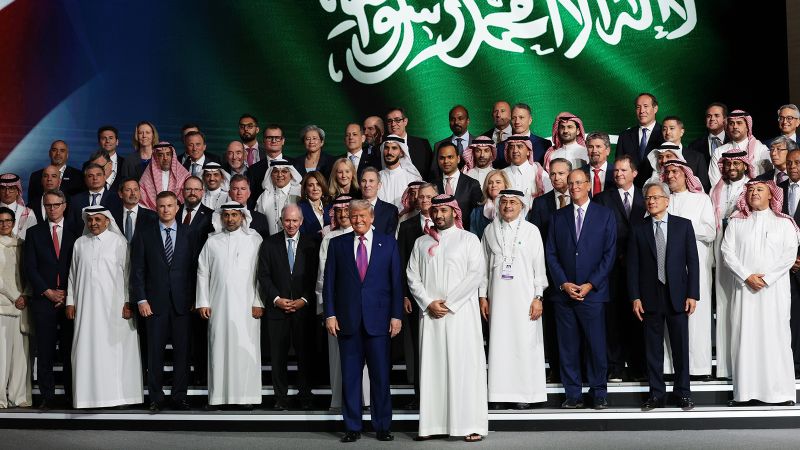US President Donald Trump’s inaugural international visit during his second term took him to Saudi Arabia, accompanied by an impressive delegation of nearly thirty high-profile CEOs from many of America’s leading corporations. This assembly included influential figures from the tech sphere, who collectively struck deals worth around $600 billion, signifying a bold venture into the world of international business and diplomacy.
At the heart of these deals were artificial intelligence (AI) chips, regarded as essential elements of the global economy’s cutting edge. These chips are expected to power significant technology infrastructure projects across the Middle East, seen as vital for ensuring the region progresses beyond its oil dependency. The initiatives reflect a broader shift towards innovation and diversification in an economy historically centered on oil revenues.
In this context, Trump’s agreements underscored the strategic importance of American AI technology as a potent bargaining tool in his diplomatic arsenal. The aim was to position himself not only as a skilled dealmaker but also as a leader fostering deeper relationships with Gulf states, particularly Saudi Arabia. This was notably a shift from the previous administration’s foreign policy stance, which had strained relations with the Kingdom following the controversial murder of journalist Jamal Khashoggi in 2018. Various reports had implicated Crown Prince Mohammed bin Salman in approving the op, leading to calls for a reassessment of US relations with Saudi Arabia.
Ahead of his departure on a three-nation tour of the Gulf, the Trump administration signified a pivotal turnaround by announcing that it would relax restrictions imposed by Biden that aimed to keep AI chips away from potential adversaries, thereby facilitating their trade with countries in this region. This policy change pointed to a renewed commitment to fostering economic ties even with nations that had been scrutinized for their human rights records and geopolitical actions.
The White House issued a statement characterizing the agreements as “historic and transformative” for both the United States and Saudi Arabia. The implication was clear: the Trump administration was keen on rewriting the narrative of US-Saudi relations, signaling a new era of cooperation in technology and investment.
While Saudi Arabia remains the globe’s largest oil exporter, it has made concerted efforts to diversify its economy, fueled by revenue from energy exports. This ambition aligns with “Vision 2030,” a strategic plan spearheaded by the Saudi government, designed to modernize the nation and reduce its economic dependence on oil. The high-profile tech deals struck during Trump’s visit reinforce this ambition, with initiatives dubbed “giga-projects” set to drive innovation across the Kingdom.
One striking development during this trip was the establishment of AI startup Humain, orchestrated by Saudi Arabia’s Public Investment Fund, which aims to position the Kingdom as a globally competitive hub for AI technologies. Nvidia, a leading AI chip designer, announced a significant partnership with Humain, planning to invest in the construction of “AI factories” expected to possess an impressive capacity of up to 500 megawatts—reflecting a remarkable leap in Saudi Arabia’s technological ambitions.
In practical terms, Nvidia’s agreement involves the sale of hundreds of thousands of state-of-the-art graphic processing units to the Kingdom over the next five years, kicking off with 18,000 advanced GB300 Grace Blackwell chips. The infrastructure these hyperscale AI data centers will provide aims to bolster Saudi capabilities in training and deploying sovereign AI models, fortifying the nation’s strategic tech ecosystem.
Other significant players, such as AMD and Qualcomm, joined in similarly momentous commitments to assist Saudi Arabia in developing AI infrastructure. AMD reportedly unveiled a $10 billion deal to further enhance AI tech in the region, indicating a clear trend toward establishing comprehensive AI networks across Saudi Arabia.
Following Saudi Arabia, Trump’s itinerary included visits to Qatar and the United Arab Emirates (UAE), both of which exhibit keen interests in advancing their own technological capabilities. For instance, in 2024, Microsoft announced a substantial investment in G42, an AI organization based in Abu Dhabi, signaling a commitment to expanding the UAE’s tech landscape and fostering partnerships with the United States in the AI sector. This undercurrent of innovation echoes the UAE’s unique positioning as the first nation to appoint a minister dedicated solely to AI, illustrating a regional commitment to embracing cutting-edge technology as central to economic growth in the coming decades.
While underscoring economic ambitions, these developments also gloss over complex geopolitical realities, including scrutiny over certain partnerships, as evidenced by ongoing investigations into G42’s alleged ties with Chinese military enterprises. Thus, the landscape of international tech diplomacy will continue to evolve as these nations navigate the intersections of economic collaboration and questions of national security. In this rapidly changing global environment, the significance of AI technologies becomes increasingly evident as nations strive to position themselves at the forefront of future innovations.



